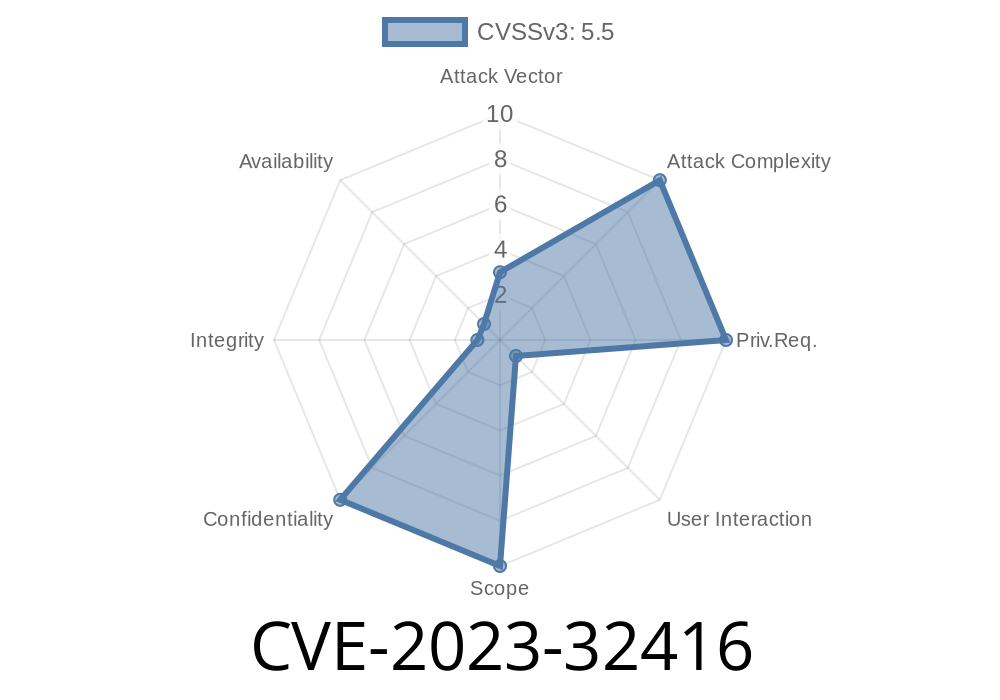When it comes to privacy, Apple’s ecosystem is considered one of the strongest. Yet, in mid-2023, a bug known as CVE-2023-32416 was discovered. This flaw allowed a rogue app to access sensitive location information on your Apple device without permission. In this article, we’ll break down how this vulnerability worked, who it affected, and, most importantly, how it was fixed. If you love your iPhone, iPad, Mac, or Apple Watch, keep reading—you’ll want to know if you were exposed.
What Was CVE-2023-32416?
CVE-2023-32416 is a security vulnerability classified as a logic issue in Apple operating systems. Rather than being a flaw in encryption or memory management, this bug existed because the system didn’t enforce location access restrictions properly. That meant an app could, under the right conditions, read your location data even if you denied those permissions.
Concern: Leaking Your Real-World Whereabouts
Location access is a powerful feature—and a risky one. If a malicious app can read where you are, it puts your privacy and sometimes safety at risk. Apple usually uses pop-ups to protect you from these data grabs, but this logic issue could let an app sidestep that decision.
watchOS 9.6 and earlier
If you were running any of these operating systems before the listed patches, your device was vulnerable.
A Peek at the Logic Issue
While Apple keeps the deepest technical details private, the bug report says there was a logic error in checking location permissions. In simple terms, a part of the code that decided if access should be allowed made an incorrect “yes” decision instead of a “no”.
Here’s a conceptual example in Swift-like pseudocode
// What should happen
if userGrantedLocationPermission {
allowLocationAccess()
} else {
denyLocationAccess()
}
// What happened in the flawed version
if checkSomeUnrelatedCondition {
allowLocationAccess() // Oops! Not checking user's real permission
} else {
denyLocationAccess()
}
Exploitation Details
No public exploit was released, but researchers believe the following strategy was possible before Apple’s fix:
- Bypassing Permission Gates: The app could avoid standard iOS/macOS permission prompts by exploiting the faulty logic branch.
- Silent Harvesting: Once bypassed, the app could collect and transmit location data to an attacker without user knowledge.
An attacker wouldn't need advanced hacking skills—just knowledge of Apple’s sensitive permission API and the logic flaw.
How Did Apple Fix It?
Apple addressed CVE-2023-32416 by “improved restrictions.” That means the location access logic is now more direct and secure. It always checks the real user-granted setting before allowing an app to read your position, closing the loophole.
From Apple’s Security Update
> “A logic issue was addressed with improved restrictions.”
> — Apple Security Updates - CVE-2023-32416
macOS Ventura 13.5 or later
- iOS/iPadOS 15.7.8 or 16.6 or later
watchOS 9.6 or later
Find exact patches here:
- Apple Security Updates
- Apple Developer CVE List
Protect Yourself: What Should You Do?
1. Update your Device:
Go to Settings → General → Software Update. Install the latest OS version.
2. Check Location Permissions:
- On iPhone/iPad: Settings → Privacy → Location Services.
Review apps with “Always” or “While Using” access.
3. Delete Suspicious Apps:
If you spot an unknown app with location access—delete it.
References & Further Reading
- Apple Security Update: July 2023
- CVE-2023-32416 at MITRE
- The Register coverage
Final Thoughts
CVE-2023-32416 is a reminder that even the best tech giants can slip up. Logic errors are tricky—one wrong “if” can put millions at risk. Apple’s fast patch kept this issue from becoming a major privacy disaster, but only if users update their devices.
Don’t wait: update your Apple devices today and keep your location private.
*If you found this article helpful, please share it with friends and encourage them to patch their devices, too!*
Timeline
Published on: 07/27/2023 01:15:27 UTC
Last modified on: 08/01/2023 19:33:14 UTC
